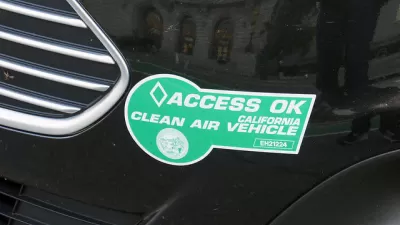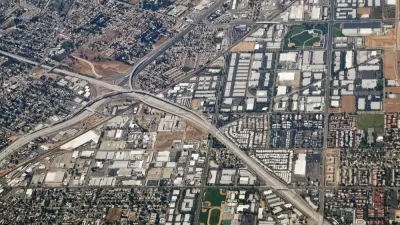Utah's I-15 express lanes are suffering PM peak-hour congestion. The maximum charge is $1 per zone. The Transportation Commission will vote to double it, but the chair of a key legislative committee suggests charging "what the market will bear."
"Utah legislators raised questions Wednesday about a proposal to double the tolls on Interstate 15 express lanes — saying they may need to be even higher to cut congestion," reports Lee Davidson for The Salt Lake Tribune on Oct. 4.
State highway officials last month proposed doubling the flexible tolls — upping the $1 maximum per section [pdf] charge to $2, depending on traffic. The Utah Transportation Commission is considering the plan, and may vote as early as next week.
Several transportation commission members earlier suggested a maximum toll of $3 or even $5, saying even $2 was too low to really reduce congestion.
Carpooling is priority
The primary purpose of the lanes, also referred to as High Occupancy Vehicle (not High Occupancy Toll) lanes is to entice motorists to carpool "so the general-purpose lanes function better,” explained Shane Marshall, deputy director of the Utah Department of Transportation (UDOT).
"It does that by trying to maintain [express lane] speeds of at least 55 mph," adds Davidson. However, speeds have dropped to 31 mph shortly after 5 p.m.
Clean fuel vehicles
A secondary priority is to provide an incentive for consumers to purchase hybrid and electric vehicles eligible for a Clean Fuel Vehicle Decal and Permit, though UDOT has placed a cap of 6,650 decals which has already been reached.
Rep. Karianne Lisonbee, R-Clearfield, raised one more option for consideration — eliminating the toll-paying, single-passenger cars from express lanes to allow more use by clean-fuel vehicles.
Final say: legislature
The Transportation Commission's recommendation goes to the legislature for final approval. Sen. Howard Stephenson, R-Draper, chairman of the Revenue and Taxation Interim Committee, also doubted that a $1 hike would be sufficient to maintain the 55 mph traffic flow.
He encouraged considering “charging the maximum the market will bear” not only to reduce congestion, but perhaps to raise some money for highways.
Stephenson also asked if UDOT has considered requiring at least three occupants — instead of two — to carpool in the express lane for free.
Marshall indicated that wasn't yet an option, but didn't rule it out in the future.
Tolls are not meant to be revenue-maker
Marshall said UDOT isn’t seeking to make money through tolls, only to cover costs of that program and help keep down congestion enough so that carpoolers may travel at least 55 mph.
Carpool cheating is rampant
Cheating, where ineligible vehicles, i.e., single-occupant vehicles without Express Pass transponders, is the highest in the country, according to UDOT. Stephenson states the violation rate is 20 percent. However, a June 2017 Mercury News article indicates that the violation rate is 30 percent in Silicon Valley.
Hat tip to AASHTO Daily Transportation Update.
FULL STORY: Utah lawmakers question plan to double tolls on freeway express lanes

Planetizen Federal Action Tracker
A weekly monitor of how Trump’s orders and actions are impacting planners and planning in America.

Restaurant Patios Were a Pandemic Win — Why Were They so Hard to Keep?
Social distancing requirements and changes in travel patterns prompted cities to pilot new uses for street and sidewalk space. Then it got complicated.

Maui's Vacation Rental Debate Turns Ugly
Verbal attacks, misinformation campaigns and fistfights plague a high-stakes debate to convert thousands of vacation rentals into long-term housing.

In California Battle of Housing vs. Environment, Housing Just Won
A new state law significantly limits the power of CEQA, an environmental review law that served as a powerful tool for blocking new development.

Boulder Eliminates Parking Minimums Citywide
Officials estimate the cost of building a single underground parking space at up to $100,000.

Orange County, Florida Adopts Largest US “Sprawl Repair” Code
The ‘Orange Code’ seeks to rectify decades of sprawl-inducing, car-oriented development.
Urban Design for Planners 1: Software Tools
This six-course series explores essential urban design concepts using open source software and equips planners with the tools they need to participate fully in the urban design process.
Planning for Universal Design
Learn the tools for implementing Universal Design in planning regulations.
Heyer Gruel & Associates PA
JM Goldson LLC
Custer County Colorado
City of Camden Redevelopment Agency
City of Astoria
Transportation Research & Education Center (TREC) at Portland State University
Jefferson Parish Government
Camden Redevelopment Agency
City of Claremont




























